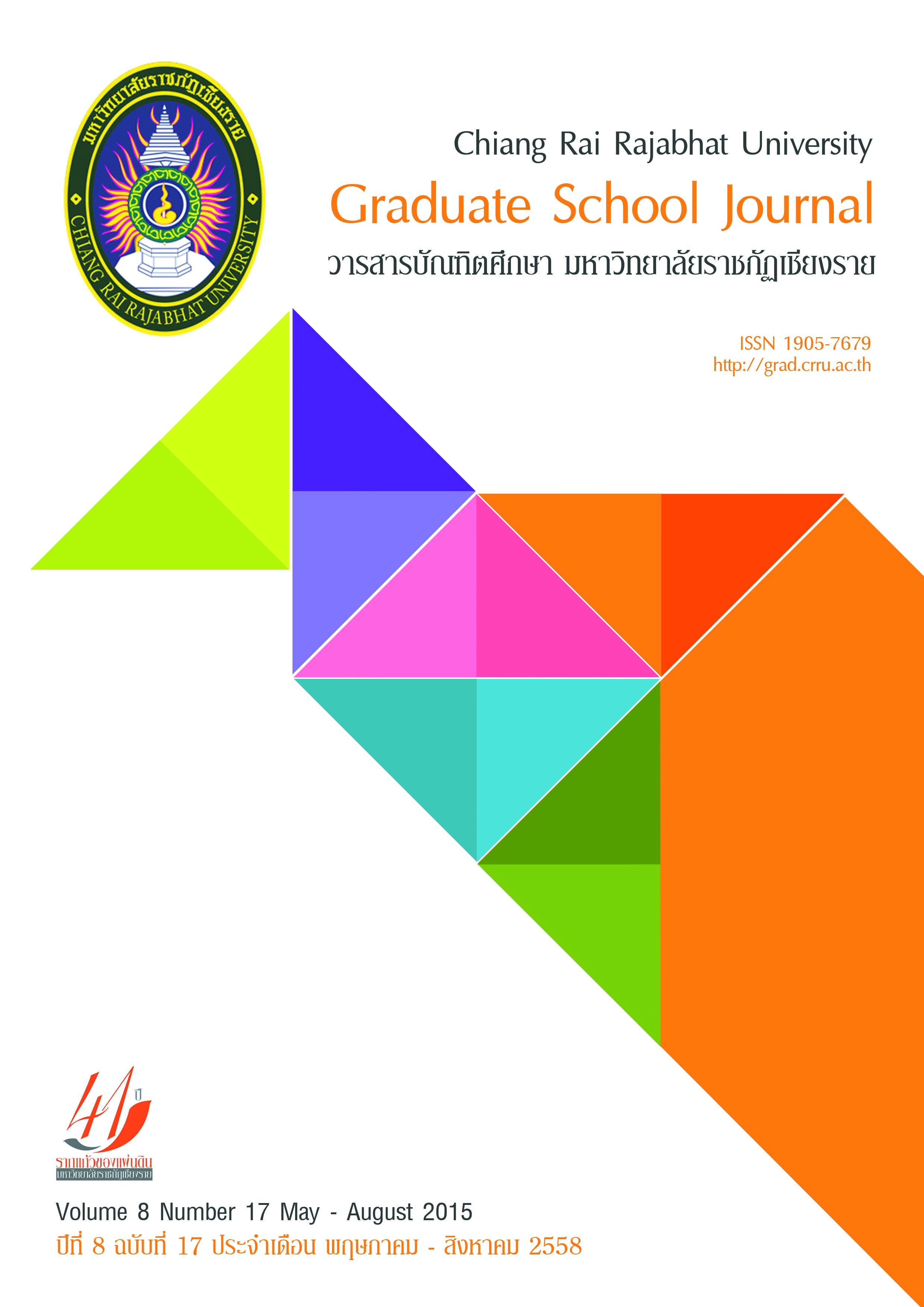คุณธรรมจริยธรรมของนักเรียนชั้นมัธยมศึกษาตอนต้น กรณีศึกษาโรงเรียนขยายโอกาส ทางการศึกษา สังกัดสำนักงานเขตพื้นที่การศึกษาเชียงราย เขต 3 ในเขตอำเภอแม่สาย จังหวัดเชียงราย
Main Article Content
บทคัดย่อ
ผลการศึกษาพบว่า ในภาพรวมระดับคุณธรรมจริยธรรมของนักเรียนชั้นมัธยมศึกษาตอนต้นในโรงเรียนขยายโอกาส ทางการศึกษา สังกัดสำนักงานเขตพื้นที่การศึกษาเชียงราย เขต 3 ในเขตอำเภอแม่สาย จังหวัดเชียงราย อยู่ในระดับสูง ปัจจัยส่วน บุคคลในระบบการศึกษาที่สนับสนุนกระบวนการขัดเกลาเชิงพฤติกรรมคุณธรรมจริยธรรมของนักเรียนชั้นมัธยมศึกษาตอนต้น คือ ปัจจัยด้านเพศ โดยที่นักเรียนเพศหญิงจะมีระดับคุณธรรมจริยธรรมที่สูงขึ้น ในขณะที่นักเรียนเพศชายยังคงแสดงพฤติกรรมใน ทิศทางลบตรงข้ามกับนักเรียนหญิง อย่างมีนัยสำคัญทางสถิติ และพบว่า นักเรียนที่มีระดับการศึกษาที่สูงขึ้น จะมีระดับคุณธรรม จริยธรรมลดลง อย่างมีนัยสำคัญทางสถิติ ส่วนปัจจัยส่วนบุคคลในระบบครัวเรือน ไม่มีอิทธิพลต่อกระบวนการขัดเกลาเชิง พฤติกรรมด้านคุณธรรมจริยธรรมของนักเรียนชั้นมัธยมศึกษาตอนต้น
แนวทางการพัฒนาคุณธรรมจริยธรรมของนักเรียนชั้นมัธยมศึกษาตอนต้น สถานศึกษา โรงเรียน สถาบันครอบครัว และ สถาบันทางสังคมต่างๆ ที่เกี่ยวข้องควรพิจารณาความร่วมมือเพื่อส่งเสริมและสร้างพฤติกรรมเชิงคุณธรรมจริยธรรมที่พึงประสงค์ ในสังคมไทย โดยใช้กระบวนการเรียนรู้ในสังคมเชิงจริยธรรม ระบบการศึกษาอย่างต่อเนื่อง มีระบบแบบแผนร่วมกัน หลักการ ทางศาสนา และการสร้างแบบอย่างปฏิบัติเชิงคุณธรรมจริยธรรมที่ดีแก่เด็กและนักเรียนในชุมชนและสถานศึกษา
Junior High-School Students’ Morality : A Case Study of Extension Education Schools under the Office of Chiangrai Education Services Area 3, Maesai District, Chiangrai Province
The purposes of this study aimed to investigate the levels and factors affecting the junior high-school students’ morality found in extension education schools of the Office of Chiangrai Education Services Area 3, Maesai District, Chiangrai Province in terms of their diligence, economy, honesty, self-discipline, politeness, hygiene, harmony, and kindness. For data collection, 300 respondents out of the nine extension education schools studying in the 1st, 2nd, and 3rd junior high-school grade were randomly sampled. The data were statistically analyzed through using mean ( ), standard deviation (S.D.), and the Enter technique-based multiple regression method.
The findings of the study revealed that all the aspects of the junior high-school students’ morality found in extension education schools of the Office of Chiangrai Education Services Area 3, Maesai District, Chiangrai Province were rated at a higher level.
In terms of their gender, it was stated that educational factors affecting the female junior high-school students’ socialization on their morality were rated at a higher level; otherwise, the male junior high-school students’ socialization on their morality, with its significant difference, remained indifferent. Besides, those junior high-school students holding with their educational backgrounds influenced on their moral ignorance. Also, their management system of living expenses was not resulted from the junior high-school students’ socialization on their morality.
Also, the on-going strategies for the development of the junior high-school students’ morality found in extension education schools of the Office of Chiangrai Education Services Area 3, Maesai District, Chiangrai Province were suggested that the provisions for the enhancement of their academic collaborations with other involved educational, family, and social institutions to strengthening the junior high-school students’ socialization on their morality together with their life-long learning management, their corporative planning management, their religion-oriented practices, as well as their practical models adopted for learners’ moral awareness be all needed.
Article Details
บทความที่ได้รับการตีพิมพ์เป็นลิขสิทธิ์ของวารสารมหาวิทยาลัยราชภัฎเชียงราย
ข้อความที่ปรากฏในบทความแต่ละเรื่องในวารสารวิชาการเล่มนี้เป็นความคิดเห็นส่วนตัวของผู้เขียนแต่ละท่านไม่เกี่ยวข้องกับมหาวิทยาลัยราชภัฎเชียงราย และคณาจารย์ท่านอื่นๆในมหาวิทยาลัยฯ แต่อย่างใด ความรับผิดชอบองค์ประกอบทั้งหมดของบทความแต่ละเรื่องเป็นของผู้เขียนแต่ละท่าน หากมีความผิดพลาดใดๆ ผู้เขียนแต่ละท่านจะรับผิดชอบบทความของตนเองแต่ผู้เดียว


